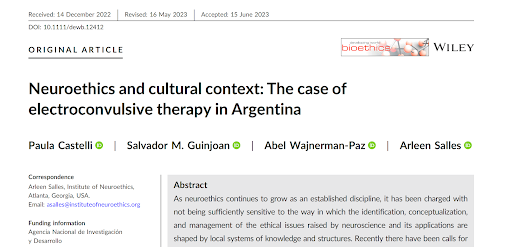ECT (Or Not) in Argentina: An Ethics Discussion
Out on PubMed, from authors in Argentina and the US, is this article:

Neuroethics and cultural context: The case of electroconvulsive therapy in Argentina.
Dev World Bioeth. 2023 Jul 12. doi: 10.1111/dewb.12412. Online ahead of print.PMID: 37436004

The article is here.
And from the text:
The stigmatization of ECT is exacerbated by the fact that, except
for a single private institution, Fundación Fleni, the educational
curriculum of resident psychiatrists in Argentina does not include
ECT training. While there are no surveys available measuring
attitudes of psychiatrists and psychologists towards ECT in Argentina,
the common clinical experience is that only an almost
insignificant percentage of mental health professionals prescribe it,
and mental health professionals tend to advise against it.
for a single private institution, Fundación Fleni, the educational
curriculum of resident psychiatrists in Argentina does not include
ECT training. While there are no surveys available measuring
attitudes of psychiatrists and psychologists towards ECT in Argentina,
the common clinical experience is that only an almost
insignificant percentage of mental health professionals prescribe it,
and mental health professionals tend to advise against it.
This is a fascinating, thoughtful and compelling article, a must-read for all ECT healthcare professionals.
The baggage of ECT's past and the use of unmodified ECT are obviously problems that we in the field still struggle to overcome. The United Nations Convention doesn't help, with its conflation of ECT and torture.
The psychiatric culture in Argentina is idiosyncratic, with an ongoing stranglehold of psychoanalytic theory pushing out biological psychiatry.
The heat of the misguided emotional arguments needs to be replaced with the light of ECT as a straightforward medical procedure; and yes, practice standards need to be high, as these authors note.
[The only criticism I have is the poor formatting of the references, which makes it very difficult to read and refer to them.]



Comments
Post a Comment